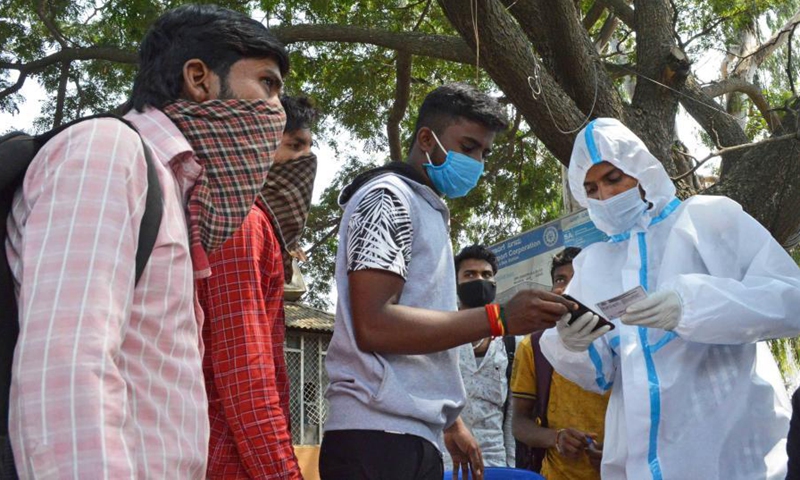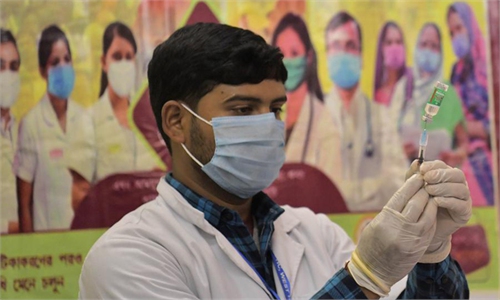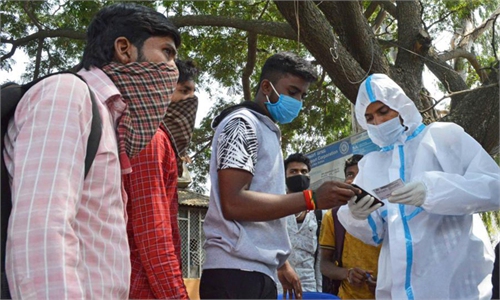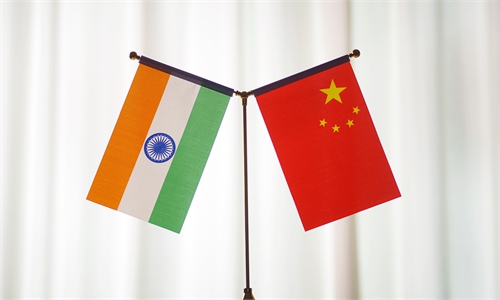Chinese vaccines could be an option to diversify supplies amid India’s emerging new COVID-19 strains

Travellers register themselves with a health worker before getting swab testings for COVID-19 outside a bus station, in Bangalore, India, Feb. 17, 2021. Photo: Xinhua
India is facing extremely severe COVID-19 infections, which required the country to adopt more draconian measures to curb further infections and launch rapid research on vaccine upgrades, Chinese experts said Monday after reports that a total of 240 new strains of COVID-19 have surfaced across India which saw a spike of infections since last week.
Randeep Guleria, director of the All-India Institute of Medical Sciences (AIIMS), said on Saturday that the new strains could be highly transmissible and dangerous, and would cause people who have antibodies re-infected, NDTV reported.
India is the world's second worst-hit country, with new COVID-19 cases surpassing 11 million on Monday.
"India has come into a state of fatigue in epidemic control, as its current epidemic control capabilities, energy, and resources have reached their limits," Lan Jianxue, deputy director of the Department for Asia-Pacific Studies at China Institute of International Studies, told the Global Times, adding that the new strains are creating more challenges.
The recent flare-ups have been mostly reported in India's western state of Maharashtra. Maharashtra chief minister Uddhav Thackeray on Sunday warned of a looming second wave of coronavirus and another lockdown, the Hindustan Times reported.
Lan noted that poor medical care levels, government's failures in epidemic control, a large population and cramped slums have led to the current difficult situation in India. The government and health departments need to take more aggressive measures in detection, tracking, and quarantine to find as many infected people as possible and cut off the chain of infections as early as possible.
India rolled out its COVID-19 inoculation campaign on January 16 to immunize 1.3 billion people. However, it would be hard for India to achieve "herd immunity," according to Guleria, as highly transmissible mutations or variants of COVID-19 may have "immune escape mechanism," that they can cause re-infections in people who have developed antibodies to the virus through vaccinations or cause re-infections.
Tao Lina, a Shanghai-based vaccine expert, told the Global Times that, in the case of the "escape mechanism," the antibodies would become ineffective, and that the possibility of re-infections is "not low."
India also plans to vaccinate 300 million people from high-risk groups by the end of July. Chinese experts noted that there is a low possibility that the country could achieve this target, considering its current situation and the limited domestic supply of vaccines.
Lan suggested India start cooperating with China on COVID-19 vaccines, bringing Chinese vaccines to India to diversify vaccine supplies domestically. "Many developing countries are using Chinese vaccines, which are reliable in efficacy and cost effective," Lan noted.
Scientific monitoring on the mutations of this virus has become pressing as new variants have been found around the world, experts said. "We need to find out whether the mutations may have a significant impact on the effectiveness of the vaccine, whether we need to develop a separate vaccine, or upgrade existing vaccines," Tao said.



